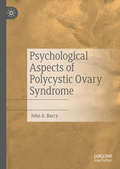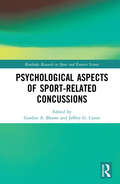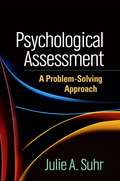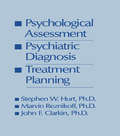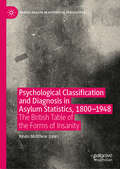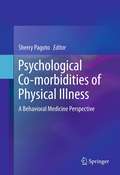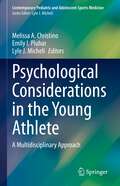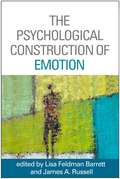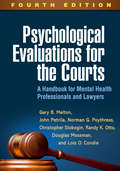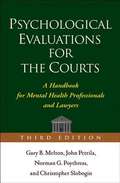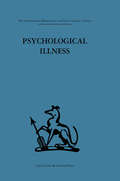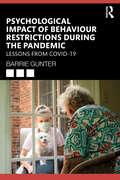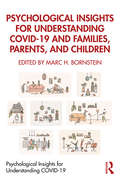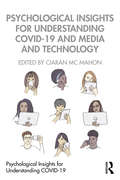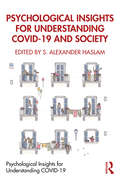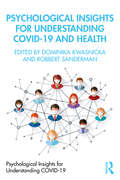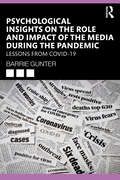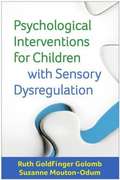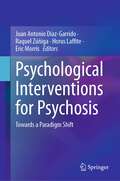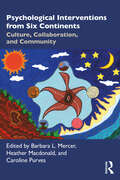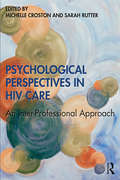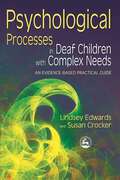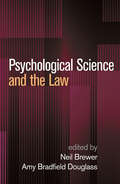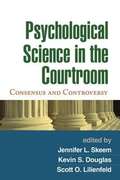- Table View
- List View
Psychological Aspects of Polycystic Ovary Syndrome
by John A. BarryThis book provides an overview of the latest knowledge of the psychological aspects of polycystic ovary syndrome (PCOS), and paves the way for advances in this rapidly evolving field. Taking an evidence-based approach, the book elucidates the ways in which PCOS causes anxiety and depression, impacts Quality of Life (QoL), and is associated with other psychological issues. The psychological impact of key features of PCOS are explored too, with a special focus on insulin resistance / diabetes, and fertility issues. The book concludes with a chapter on practical recommendations on how best to help with anxiety and depression in PCOS. An important feature of this book is its identification of the ways in which testosterone, a defining characteristic of PCOS, impacts psychology. In doing so it fills a lacunae in current research and offers evidence that maps out the complex ways in which biology impacts psychology in PCOS, and also how psychology can be harnessed to impact biology in a positive way. It will appeal in particular to scholars and clinicians in the fields of health psychology and women’s health.
Psychological Aspects of Sport-Related Concussions (Routledge Research in Sport and Exercise Science)
by Gordon A. Bloom Jeffrey G. CaronRecognition of concussion as a serious injury, informed by neurological and physiological research, is now commonplace in sport. However, research on the psychology of concussive injury—its psychological implications and outcomes, and psychological interventions for prevention and recovery—has largely been overlooked. This is the first book to explicitly and authoritatively set out the psychological aspects of sport-related concussion from a multidisciplinary and global perspective <P><P>The book attempts to offer a global understanding of the injury by presenting an historical overview; exploring the psychological implications of sport-related concussion and the influence of gender and sociocultural context on concussive injury and recovery; setting out practical guidance on working with special populations suffering from concussive injuries; and discussing the theoretical and methodological considerations for research on concussion and future directions for this research. <P><P>Written by a group of leading international experts and offering a hitherto underdeveloped perspective on this crucial area of sports injury research, this book is crucial reading for any upper-level student, researcher, sport scientist, coach, or allied health professional working on sport-related concussion. It is also valuable reading for students and researchers interested in the psychosocial processes that impact injury and recovery or general professional practice in sport psychology.
Psychological Assessment
by Julie A. SuhrThis authoritative clinical reference and text provides a complete guide to conducting empirically based assessments to support accurate diagnoses and better clinical care. The book builds crucial skills for gathering and interpreting data for specific assessment purposes. It also presents more advanced ways to integrate information from tests, interviews, observations, and other sources, within a biopsychosocial framework that fully addresses the needs of each client. Particular attention is given to accounting for potential biases that affect every stage of the decision-making process. User-friendly features include case examples, advice on writing reports and giving feedback to clients, and a detailed sample report.
Psychological Assessment, Psychiatric Diagnosis, And Treatment Planning
by John F. Clarkin Marvin Reznikoff Steven W. HurtFirst published in 1991. Routledge is an imprint of Taylor & Francis, an informa company.
Psychological Classification and Diagnosis in Asylum Statistics, 1800 - 1948: The British Table of the Forms of Insanity (Mental Health in Historical Perspective)
by Kevin Matthew JonesThis book provides a detailed examination of the questions that preoccupied British alienists throughout the second half of the nineteenth century. Was insanity one disorder with different forms or a set of distinct natural kinds that each had different causes, symptoms, and outlooks? Was it possible to devise a standardised classification of the insanities that provides a scientific basis to psychological diagnosis? Could statistics on psychological diagnosis provide data to help reveal the nature of insanity? The classification at the centre of these debates, the Medico-Psychological Association’s Table of the Forms of Insanity, caused deep divisions that took decades to resolve and hampered efforts to develop asylum medical statistics on psychological diagnosis. The use of the classification in national medical statistics was tantamount to being the standard classification for the asylum. As the appeal of statistics grew within medical circles, the debates intensified, and the divisions grew deeper. Despite lofty aims and years of debate, attempts to develop national statistics on psychological diagnosis had achieved very little by the beginning of the twentieth century. The failure of these efforts, hampered by the unwieldy processes adopted by Lunacy administration, led to the Table of the Forms falling into obscurity after its final set of revisions in 1932. In presenting for the first time the debates surrounding the Table of the Forms of Insanity, this volume calls for a re-evaluation of the history of psychiatric classification through its exploration of the underappreciated links between the standardisation of psychological diagnosis and the development of mental health statistics. By interrogating the links between asylum governance and the clinic, this book presents considerations on classification that still resound today, and provides valuable reading for scholars interested in the social history of medicine, the history of psychiatry, and the history of science.
Psychological Co-morbidities of Physical Illness
by Sherry PagotoEvidence for the efficacy of behavioral approaches to the treatment and management of physical illness is mounting, as is the evidence for behavioral interventions for psychological disorders. A pressing question that remains is how to effectively treat co-morbid physical and psychological illnesses. Diseases co-occur more often than not, and the co-occurrence of physical and psychological illnesses is associated with greater impairment and healthcare costs. Unfortunately, the treatment literature has traditionally been disease-specific, with fewer insights and discoveries regarding the underlying processes of co-morbid physical and psychological illnesses, and even fewer of approaches to treatment. Research on co-morbidities between physical and psychological illnesses has focused primarily on depression. Quite extensive literatures describe the negative impact of depression on type 2 diabetes, cardiovascular disease, cancer, obesity, pain, and other physical illnesses. More recently, higher rates of physical illness have been documented in individuals with bipolar disorder, anxiety disorders, schizophrenia, and impulse control disorders. Studies emanating from the National Comorbidity Survey-Replication (NCS-R), the only U.S. population-based database that includes diagnostic information on all DSM-IV psychological disorders, have revealed strong links between a number of physical and psychological illnesses. These data draw attention to the prevalence of physical and psychological co-morbidities at the population level, which has stimulated research on the biobehavioral mechanisms of those co-morbidities, with the goal of developing and improving treatment approaches. As this area of research grows, practical resources are needed for clinicians and researchers who encounter individuals with co-morbid physical and psychological illnesses in their work. This book is the first to provide a comprehensive overview of psychological co-morbidities of physical illness, biological and behavioral mechanisms of those co-morbidities, and implications for treatment. Each chapter focuses on a physical condition, such as obesity, type 2 diabetes, HIV infection, tobacco dependence, cardiovascular disease, cancer, asthma, pain, irritable bowel syndrome, autoimmune disorders, and obstetric/gynecological conditions. Chapters are structured to cover 1) the epidemiology of the most prevalent co-morbid psychological disorders within that physical condition (e.g., depression and other mood disorders, anxiety disorders, psychotic disorders, impulse control disorders, and eating disorders; 2) biobehavioral mechanisms of the co-morbidity; 3) a review of the behavioral treatment literature including evidence-based practice guidelines (where available); and 4) treatment considerations including issues of stepped care, evidence-based treatment decisions, treatment sequencing, treatment blending, treatment interactions, and contraindications. Content is guided by available research evidence and relevant theoretical models, and it is presented in such a way as to inform clinical practice, identify important gaps in the research literature, and provide directions for future research. The book serves as a tool for clinicians and researchers who work in the area of behavioral medicine in medical, academic, and/or training settings. Patients with psychological and medical co-morbidities may be encountered by clinicians working in either mental health or medical settings, where the presenting problem could be either the psychological disorder or the medical disorder. As such, assessment and treatment issues are discussed from both perspectives. For the clinician, the book reviews brief assessment tools, provides practical summaries of the treatment outcome literature and treatment considerations (e.g., treatment sequencing, contraindications), and includes treatment decision hierarchies that help the clinician incorporate each facet of evidence-based decisions (the evidence, patient characteristics, and their own expertise). For the researcher, the b...
Psychological Considerations in the Young Athlete: A Multidisciplinary Approach (Contemporary Pediatric and Adolescent Sports Medicine)
by Lyle J. Micheli Melissa A. Christino Emily I. PluharThis book provides a broad and multidisciplinary review of psychological aspects of sport participation that are important to consider in young athletes. It discusses the many psychosocial benefits of sports, describes common mental health and body image issues pediatric athletes may suffer from, explains the psychological effects of injury and surgery on young athletes and the importance of mind-body connection, and advocates for safe sport participation and a multidisciplinary approach to the care of young athletes. This is the first text to discuss the psychological implications of sport participation in young athletes – a critical topic in today’s sport landscape that is often underappreciated and understudied. Bringing together contributions from prominent sports psychologists, sports medicine physicians and surgeons, coaches, and pain management specialists, Psychological Considerations in the Young Athlete combines the most up-to-date research, and serves as a valuable resource for clinicians, therapists, and athletic trainers who serve pediatric and adolescent athletes and sports teams.
Psychological Construction of Emotion
by James A. Russell Lisa Feldman BarrettThis volume presents cutting-edge theory and research on emotions as constructed events rather than fixed, essential entities. It provides a thorough introduction to the assumptions, hypotheses, and scientific methods that embody psychological constructionist approaches. Leading scholars examine the neurobiological, cognitive/perceptual, and social processes that give rise to the experiences Western cultures call sadness, anger, fear, and so on. The book explores such compelling questions as how the brain creates emotional experiences, whether the "ingredients" of emotions also give rise to other mental states, and how to define what is or is not an emotion. Introductory and concluding chapters by the editors identify key themes and controversies and compare psychological construction to other theories of emotion.
Psychological Disorders in Obstetrics and Gynaecology for the MRCOG and Beyond
by Khaled Mk Ismail Ilana Crome Pm Shaughn O'Brien Jennifer HighamThis book covers the psychological conditions associated with the many phases of a woman's lifespan: the menarche; the menstrual cycle; infertility; pregnancy and the puerperium; and menopause and perimenopause. Issues such as eating disorders, substance misuse and other disorders are also addressed. For each condition, the nature and extent of the condition, detection or diagnosis, the pharmacological and psychosocial interventions available, and the importance of referral and co-working with multidisciplinary teams are covered. The book is primarily designed to provide a comprehensive summary for candidates preparing for the Part 2 MRCOG examination, and as such covers the RCOG curriculum for psychological disorders. It is also a valuable guide for all healthcare professionals needing a clearer understanding of this important area.
Psychological Evaluations for the Courts, Fourth Edition: A Handbook for Mental Health Professionals and Lawyers
by John Petrila Randy K. Otto Gary B. Melton Norman G. Poythress Christopher Slobogin Douglas Mossman Lois O. CondieTens of thousands of readers have relied on this leading text and practitioner reference--now revised and updated--to understand the issues the legal system most commonly asks mental health professionals to address. Highly readable, the volume demystifies the forensic psychological assessment process and provides guidelines for participating effectively and ethically in legal proceedings. Presented are clinical and legal concepts and evidence-based assessment procedures pertaining to criminal and civil competencies, the insanity defense and related doctrines, sentencing, civil commitment, personal injury claims, antidiscrimination laws, child custody, juvenile justice, and other justice-related areas. Case examples, exercises, and a glossary facilitate learning; 19 sample reports illustrate how to conduct and write up thorough, legally admissible evaluations. New to This Edition *Extensively revised to reflect important legal, empirical, and clinical developments. *Increased attention to medical and neuroscientific research. *New protocols relevant to competence, risk assessment, child custody, and mental injury evaluations. *Updates on insanity, sentencing, civil commitment, the Americans with Disabilities Act, Social Security, juvenile and family law, and the admissibility of expert testimony. *Material on immigration law (including a sample report) and international law. *New and revised sample reports.
Psychological Evaluations for the Courts, Third Edition
by Gary Melton John PetrilaThis is the definitive reference and text for both mental health and legal professionals. The authors offer a uniquely comprehensive discussion of the legal and clinical contexts of forensic assessment, along with best-practice guidelines for participating effectively and ethically in a wide range of criminal and civil proceedings. Presented are findings, instruments, and procedures related to criminal and civil competencies, civil commitment, sentencing, personal injury claims, antidiscrimination laws, child custody, juvenile justice, and more.
Psychological Illness: A community study
by E J R PrimroseTavistock Press was established as a co-operative venture between the Tavistock Institute and Routledge & Kegan Paul (RKP) in the 1950s to produce a series of major contributions across the social sciences. This volume is part of a 2001 reissue of a selection of those important works which have since gone out of print, or are difficult to locate. Published by Routledge, 112 volumes in total are being brought together under the name The International Behavioural and Social Sciences Library: Classics from the Tavistock Press. Reproduced here in facsimile, this volume was originally published in 1962 and is available individually. The collection is also available in a number of themed mini-sets of between 5 and 13 volumes, or as a complete collection.
Psychological Impact of Behaviour Restrictions During the Pandemic: Lessons from COVID-19
by Barrie GunterThis volume examines the undesirable or harmful cognitive, emotional and behavioural side-effects of COVID-19 and of the behavioural restrictions imposed by governments on their populations during the pandemic. Societal "lockdowns" and other intervening behavioural restrictions, built significantly around social isolation, used by governments to control the spread of COVID-19 disrupted the lives of most people. There were economic costs for many as workplaces closed down, as well as severe stresses on friendships and romantic relationships, an increase in instances of abuse and domestic violence, and concerns about people drinking too much alcohol or gambling too much as compensatory behaviours. Understanding which people were at risk, and in what ways, could teach important lessons for the future. Presenting a timely review of the most recent international research and evidence, author Barrie Gunter assesses the major collateral, psychological side-effects of the pandemic. Looking forward, Gunter also considers how new models might be developed that take into account not just the need to halt the spread of a new virus, but also minimise collateral damage which could be every bit as severe in both the short term and long term. Identifying and analysing the nature and severity of collateral side-effects of pandemic-related behaviour restrictions, this is essential reading for students and researchers in psychology, public health and medical sciences and policymakers assessing government strategies, responses and performance.
Psychological Insights for Understanding COVID-19 and Families, Parents, and Children (Psychological Insights for Understanding COVID-19)
by Marc H. BornsteinWith specially commissioned introductions from international experts, the Psychological Insights for Understanding COVID-19 series draws together previously published chapters on key themes in psychological science that engage with people’s unprecedented experience of the pandemic. This volume collects chapters that address prominent issues and challenges presented by the SARS-CoV-2 pandemic to families, parents, and children. A new introduction from Marc H. Bornstein reviews how disasters are known to impact families, parents, and children and explores traditional and novel responsibilities of parents and their effects on child growth and development. It examines parenting at this time, detailing consequences for home life and economies that the pandemic has triggered; considers child discipline and abuse during the pandemic; and makes recommendations that will support families in terms of multilevel interventions at family, community, and national and international levels. The selected chapters elucidate key themes including children’s worry, stress and parenting, positive parenting programs, barriers which constrain population-level impact of prevention programs, and the importance of culturally adapting evidence-based family intervention programs. Featuring theory and research on key topics germane to the global pandemic, the Psychological Insights for Understanding COVID-19 series offers thought-provoking reading for professionals, students, academics, policy makers, and parents concerned with the psychological consequences of COVID-19 for individuals, families, and society.
Psychological Insights for Understanding COVID-19 and Media and Technology (Psychological Insights for Understanding COVID-19)
by Ciarán Mc MahonIn the Psychological Insights for Understanding COVID-19 series, international experts introduce important themes in psychological science that engage with people’s unprecedented experience of the pandemic, drawing together chapters as they originally appeared before COVID-19 descended on the world. This book explores how COVID-19 has impacted our relationship with media and technology, and chapters examine a range of topics including fake news, social media, conspiracy theories, belonging, online emotional lives and relationship formation, and identity. It shows the benefits media and technology can have in relation to coping with crises and navigating challenging situations, whilst also examining the potential pitfalls that emerge due to our increasing reliance on them. In a world where the cyberpsychological space is constantly developing, this volume exposes the complexities surrounding the interaction of human psychology with media and technology, and reflects on what this might look like in the future. Featuring theory and research on key topics germane to the global pandemic, the Psychological Insights for Understanding COVID-19 series offers thought-provoking reading for professionals, students, academics and policy makers concerned with the psychological consequences of COVID-19 for individuals, families and society.
Psychological Insights for Understanding COVID-19 and Society (Psychological Insights for Understanding COVID-19)
by S. Alexander HaslamIn the Psychological Insights for Understanding COVID-19 series, international experts introduce important themes in psychological science that engage with people’s unprecedented experience of the pandemic, drawing together chapters as they originally appeared before COVID-19 descended on the world. This book explores how COVID-19 has impacted society, and chapters examine a range of societal issues including leadership and politics, community, social status, welfare, social exclusion and accountability. Addressing the social and psychological processes that structure, and are structured by, our social contexts, it shows not only how groups and individuals can come together to manage global crises, but also how these crises can expose weaknesses in our society. The volume also reflects on how we can work together to rebuild society in the aftermath of the pandemic, by cultivating a shared sense of responsibility through social integration and responsible leadership. Showcasing theory and research on key topics germane to the global pandemic, the Psychological Insights for Understanding COVID-19 series offers thought-provoking reading for professionals, students, academics and policy makers concerned with the psychological consequences of COVID-19 for individuals, families and society.
Psychological Insights for Understanding Covid-19 and Health (Psychological Insights for Understanding COVID-19)
by Dominika Kwasnicka; Robbert SandermanWith specially commissioned introductions from international experts, the Psychological Insights for Understanding COVID-19 series draws together previously published chapters on key themes in psychological science that engage with people’s unprecedented experience of the pandemic. In this volume on health, Dominika Kwasnicka and Robbert Sanderman introduce chapters that explore the crucial topics of health behaviour change, wellbeing, stress, and coping. They highlight the key role digital health technologies can play in how we manage health conditions, and how we facilitate change to help individuals manage stressful situations such as physical isolation, job loss, and financial strain during the COVID-19 pandemic. The volume also offers an important overview of environmental and policy-based approaches to health behaviour change and addresses the highly relevant issues of identity and trust and how they shape the health of individuals, communities, and society. Highlighting theory and research on these key topics germane to the global pandemic, the Psychological Insights for Understanding COVID-19 series offers thought-provoking reading for professionals, students, academics, and policymakers concerned with psychological consequences of COVID-19 for individuals, families, and society.
Psychological Insights on the Role and Impact of the Media During the Pandemic: Lessons from COVID-19
by Barrie GunterThis volume places the spotlight on the role different media and communications systems played in informing the public about the pandemic, shaping their views about what was happening and contributing to behavioural compliances with pandemic-related restrictions. Throughout the pandemic, media coverage has played an important role in drawing attention to specific messages, influencing public risk perceptions and fear responses. Mainstream media and other electronic communication systems such as Facebook and WhatsApp have been pivotal in getting pandemic information out to the public, thereby influencing their beliefs, attitudes and behaviour and engaging them generally in the pandemic as stakeholders. In this timely volume, author Barrie Gunter considers how people reacted to this coverage and its contribution to their understanding of what was going on, including the influence of fake news and misinformation on public beliefs about the pandemic, from anti-lockdown protests to the "anti-vaxx" movement. In addition, looking at how government messaging was not always consistent or clear and how different authorities were found not always to be in harmony or compliance with the messages they put out, Gunter examines the harm done by presenting different publics with ambiguous or conflicting narratives. Drawing out important communications strategy lessons to be learned for the future, this is essential reading for students and researchers in psychology, public health and medical sciences and for policymakers who assess government strategies, responses and performance.
Psychological Interventions for Children with Sensory Dysregulation
by Suzanne Mouton-Odum Ruth Goldfinger GolombSensory processing difficulties can lead to puzzling, hard-to-treat emotional and behavioral challenges in children and adolescents. For example, children who can't filter normal background sounds may seem anxious, those oversensitive to touch may seem phobic, and those who seek sensory input may appear hyperactive. Filled with case vignettes, this highly informative guide helps mental health clinicians recognize and address sensory dysregulation that may co-occur with or be misdiagnosed as anxiety disorders, attention-deficit/hyperactivity disorder, and other psychological or behavioral problems. In rich detail, the authors illustrate how to modify cognitive-behavioral therapy and other evidence-based interventions to meet this population's unique needs and make treatment more effective. Reproducible clinical tools can be downloaded and printed in a convenient 8 1/2" x 11" size.
Psychological Interventions for Psychosis: Towards a Paradigm Shift
by Eric Morris Juan Antonio Díaz-Garrido Raquel Zúñiga Horus LaffiteThis book shows how psychological and social interventions can help people with psychosis. It brings together both theoretical chapters that contribute to the reconceptualization of psychosis and clinical cases illustrating how contemporary psychotherapeutic intervention models can be applied in the treatment of this mental health condition, with reflections, strategies and practical guidelines demonstrating how these models can inform professional practice in mental healthcare. Chapters brought together in this volume aim to reflect a paradigm shift in psychosis care. They present person-centered models that lead to a way of seeing, understanding and treating psychosis that is very different from the traditional biomedical model. Current authors and approaches are revolutionizing an outdated model trapped in purely pharmacological actions and tautological explanations of a biological nature, where symptom control is the basic and fundamental form of approach, and in which psychotherapeutic actions take second place as subsidiary to the former. Approaches such as Acceptance and Commitment Therapy, Acceptance and Recovery Therapy by Levels, Open Dialogue, Compassion-Centered Therapy or the Hearing Voices movement, to name but a few of those presented in this book, represent a journey of self-knowledge and learning for those recovering from psychosis, and have an intense transformative potential for the therapeutic team. The fundamental principle that guides this book is to share models belonging to psychology that aim at personal development while respecting the needs, values and goals of each person, and that can be adopted by any professional or student of clinical psychology, psychiatry, nursing, social work or any other discipline searching for more humanistic approaches to treat psychosis.
Psychological Interventions from Six Continents: Culture, Collaboration, and Community
by Barbara L. MercerThis book presents psychological assessment and intervention in a cultural and relational context. A diverse range of contributors representing six continents and eleven countries write about their therapeutic interventions, all of which break the traditional assessor-as-expert-oriented framework and offer a creative adaptation in service delivery. A Collaborative/Therapeutic Assessment model, including work with immigrant communities, and Indigenous modalities underscore individual and collective case illustrations highlighting equality in the roles of the provider and the receiver of services. The universality and uniqueness of culture are explored as a construct and through case material. Some chapters describe a partnership with a Eurocentric scientific model, while others adopt a purely community method, preserved with Indigenous language and subjective methodology. This volume brings together diverse therapeutic collaborative ideas, and recognizes relational, community, and cultural psychologies as integral to mainstream assessment and intervention literature. This book is essential for psychologists and clinicians internationally and graduate students.
Psychological Perspectives in HIV Care: An Inter-Professional Approach
by Michelle CrostonThe care paradigm for people with HIV has shifted from managing progressive illness with a poor prognosis to managing a chronic condition. Despite this improvement, people living with HIV continue to experience considerable stresses, so promoting their holistic wellbeing is a key aspect of long-term care. This book provides an accessible introduction for healthcare professionals who work with people living with HIV. It is designed to help readers understand how care in practice can be more person-centred and psychologically focused, whilst promoting compassion, health and wellbeing. Topics covered include self-awareness, attachment theories and communication as well as key aspects of providing care for people living with HIV, such as stigma in young adults, neurocognitive issues, the sexualized use of drugs, managing neuropathic pain, and the needs of older adults living with HIV. Invaluable reading for health professionals working within multidisciplinary teams that provide care for people living with HIV, this book is also a core text for those studying in the area.
Psychological Processes in Deaf Children with Complex Needs: An Evidence-Based Practical Guide
by Lindsey Edwards Marschark Susan Crocker`This volume offers a broad perspective on psychological processes in children with complex needs. Armed with this valuable tool, professionals, parents, and educators will be much better prepared to offer deaf and hard of hearing children the support and opportunities they deserve.' - from the Foreword by Marc Marschark Psychological Processes in Deaf Children with Complex Needs is a concise and authoritative guide for professionals working with deaf children and their families. The effects of hearing impairments on learning, social development and family life can be profound. They can impact on attachment, parenting and family interaction, and can affect cognitive and neuropsychological processes including perception and memory. This guide draws on the latest evidence to explain the impact of hearing impairment and uses case studies to focus on the key issues for assessment and intervention. It also suggests practical strategies for treatment and development for those working with hearing impaired children.
Psychological Science and the Law
by Neil Brewer and Amy Bradfield DouglassPsychological research can provide constructive explanations of key problems in the criminal justice system--and can help generate solutions. This state-of-the-art text dissects the psychological processes associated with fundamental legal questions: Is a suspect lying? Will an incarcerated individual be dangerous in the future? Is an eyewitness accurate? How can false memories be implanted? How do juries, experts, forensic examiners, and judges make decisions, and how can racial and other forms of bias be minimized? Chapters offer up-to-date reviews of relevant theory, experimental methods, and empirical findings. Specific recommendations are made for improving the quality of evidence and preserving the integrity of investigative and legal proceedings.
Psychological Science in the Courtroom
by Jennifer Skeem Kevin DouglasThis rigorous yet reader-friendly book reviews the state of the science on a broad range of psychological issues commonly encountered in the forensic context. The goal is to help professionals and students differentiate between supported and unsupported psychological techniques--and steer clear of those that may be misleading or legally inadmissible. Leading contributors focus on controversial issues surrounding recovered memories, projective techniques, lie detection, child witnesses, offender rehabilitation, psychopathy, violence risk assessment, and more. With a focus on real-world legal situations, the book offers guidelines for presenting scientific evidence accurately and effectively in courtroom testimony and written reports.
